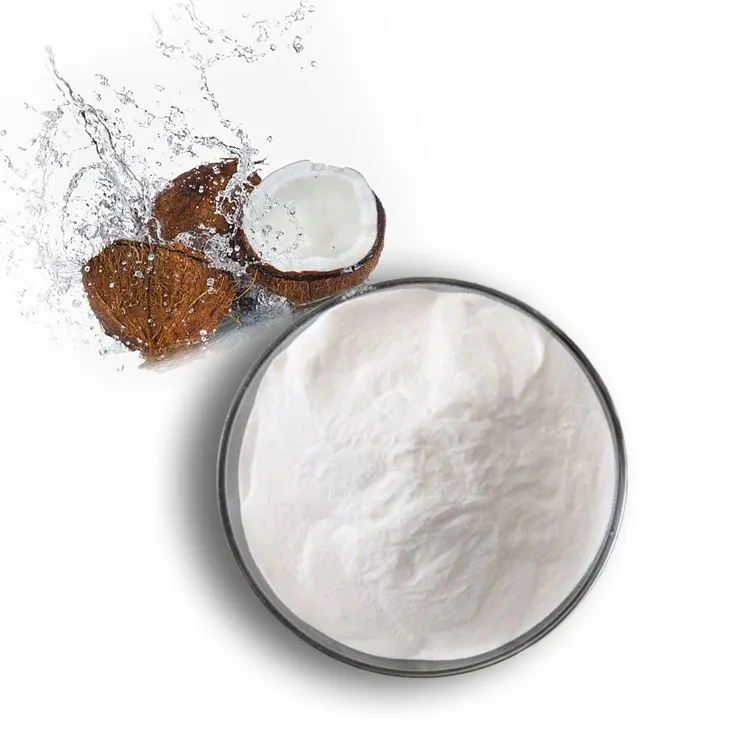- 0086-571-85302990
- sales@greenskybio.com
Use coconut water powder? Make sure you source from sustainable suppliers!
2024-12-19

The Growing Popularity of Coconut Water Powder
Coconut Water Powder has been gaining significant popularity in recent years. It offers a convenient way to enjoy the benefits of coconut water without the need to handle fresh coconuts. This powdered form can be easily stored, transported, and used in a variety of applications, such as in the food and beverage industry, for sports nutrition products, and in home cooking.
The demand for Coconut Water Powder has been on the rise, driven by factors like the increasing awareness of its health benefits. Coconut water is known for being rich in electrolytes, vitamins, and minerals, which makes it a great natural alternative to commercial sports drinks. As a result, more and more consumers are looking for ways to incorporate coconut water powder into their daily routines.

The Importance of Sustainable Sourcing in the Coconut Water Powder Industry
Environmental Considerations
Sustainable cultivation practices: When sourcing coconut water powder, it is crucial to ensure that the coconuts are grown in an environmentally friendly manner. This means promoting sustainable agricultural practices such as organic farming and agroforestry. Organic farming helps to reduce the use of harmful pesticides and fertilizers, which can have a negative impact on the soil, water, and surrounding ecosystems. Agroforestry, on the other hand, involves growing coconuts in combination with other trees and plants, creating a more diverse and resilient ecosystem.
Biodiversity protection: Coconut plantations can either support or harm biodiversity. Sustainable suppliers will take steps to protect the natural habitats within and around their plantations. This includes protecting native plant species, providing habitats for wildlife, and ensuring that the plantation does not contribute to deforestation. For example, some sustainable coconut farms in tropical regions are home to a variety of bird species, insects, and small mammals that rely on the diverse plant life in the area.
Water management: Coconuts require a significant amount of water to grow, and sustainable sourcing involves proper water management. Suppliers should implement efficient irrigation systems to avoid water wastage. In some regions, this may involve using drip irrigation systems that deliver water directly to the roots of the coconut trees, reducing evaporation and runoff. Additionally, sustainable suppliers may also take measures to protect water sources from pollution, ensuring that the water used in coconut cultivation is clean and safe.
Ethical Aspects
Fair labor practices: Ethical sourcing of coconut water powder means ensuring that the workers involved in the production process are treated fairly. This includes providing fair wages, safe working conditions, and reasonable working hours. In many coconut - producing regions, workers are often from low - income communities, and it is essential that they are not exploited. For instance, some sustainable suppliers have programs in place to provide training and education opportunities for their workers, helping to improve their skills and long - term employment prospects.
Community development: Sustainable suppliers also play an important role in the development of local communities. They may invest in local infrastructure, such as building schools, clinics, or roads. This not only benefits the workers and their families but also the entire community. By supporting local development, sustainable coconut water powder suppliers contribute to the overall well - being of the regions where coconuts are grown.
Supply chain transparency: Transparency in the supply chain is a key ethical consideration. Consumers are increasingly interested in knowing where their products come from and how they are produced. Sustainable suppliers should be able to provide clear information about the origin of the coconuts, the production processes involved, and the conditions under which the workers operate. This allows consumers to make informed choices and support companies that uphold ethical standards.
Quality Assurance
Consistency in product quality: Sustainable suppliers are more likely to have strict quality control measures in place. They understand that maintaining a consistent quality of coconut water powder is essential for customer satisfaction. This involves proper harvesting techniques, processing, and storage. For example, coconuts should be harvested at the right maturity level to ensure the best flavor and nutritional content in the resulting powder. Additionally, during processing, strict hygiene standards must be followed to prevent contamination.
Traceability: Traceability is closely related to supply chain transparency but also has implications for quality. Being able to trace the origin of the coconuts used in the powder back to the specific farms allows for better quality management. If there is an issue with a particular batch of coconut water powder, it can be traced back to its source, enabling corrective actions to be taken quickly. This also helps in ensuring that only high - quality coconuts are used in the production process.

Challenges in Sourcing from Sustainable Suppliers
Limited availability: One of the main challenges in sourcing from sustainable suppliers is the limited availability of sustainably sourced coconut water powder. While the demand for sustainable products is growing, the supply has not always been able to keep up. This is partly due to the fact that sustainable farming practices may require more time, effort, and investment compared to conventional methods. As a result, it can be difficult for companies to find sufficient quantities of sustainably sourced coconut water powder to meet their production needs.
Higher costs: Sustainable sourcing often comes with higher costs. This is because sustainable suppliers may need to invest in environmentally friendly technologies, pay fair wages to workers, and support community development initiatives. These additional costs are often passed on to the consumers in the form of higher prices. For some consumers, the higher price of sustainably sourced coconut water powder may be a deterrent, especially if they are price - sensitive.
Lack of awareness: There is still a lack of awareness among some consumers and businesses about the importance of sustainable sourcing in the coconut water powder industry. Many people may not be aware of the environmental, ethical, and quality benefits of sourcing from sustainable suppliers. Without this awareness, there is less incentive for companies to seek out sustainable sources, and consumers may not be willing to pay the premium for sustainable products.

How to Ensure Sourcing from Sustainable Suppliers
Research and certification: One of the first steps in ensuring sustainable sourcing is to do thorough research on potential suppliers. Look for suppliers who have certifications such as Fairtrade, Organic, or other recognized sustainability standards. These certifications indicate that the suppliers have met certain criteria in terms of environmental protection, ethical labor practices, and quality control. For example, Fairtrade certification ensures that farmers receive a fair price for their coconuts and that workers are treated fairly.
Direct relationships: Establishing direct relationships with suppliers can also help in ensuring sustainable sourcing. By working directly with the suppliers, companies can have more control over the production process and can ensure that their sustainability requirements are being met. This also allows for better communication and the ability to address any issues that may arise more quickly.
Industry collaboration: The coconut water powder industry can benefit from greater collaboration among different stakeholders. This includes producers, suppliers, consumers, and non - governmental organizations. By working together, they can develop and promote sustainable practices, share best practices, and raise awareness about the importance of sustainable sourcing. For example, industry associations can play a role in setting sustainability standards and promoting their adoption across the industry.
The Future of Sustainable Sourcing in the Coconut Water Powder Industry
As consumer awareness continues to grow, the future of sustainable sourcing in the coconut water powder industry looks promising. There is likely to be an increasing demand for sustainably sourced products, which will drive more suppliers to adopt sustainable practices. In addition, technological advancements may make sustainable farming and production more efficient and cost - effective, helping to overcome some of the current challenges.
However, it will also require continued efforts from all stakeholders. Governments may need to provide support through policies and incentives to encourage sustainable farming. Consumers will need to be more conscious of their purchasing decisions and be willing to pay a premium for sustainable products. And the industry itself will need to continue to innovate and collaborate to ensure that sustainable sourcing becomes the norm rather than the exception.
FAQ:
Q1: Why is it important to source coconut water powder from sustainable suppliers?
Sourcing from sustainable suppliers in the coconut water powder industry is crucial for several reasons. Environmentally, sustainable practices ensure that coconut plantations are managed in a way that protects natural habitats, conserves water, and reduces pollution. Ethically, it often means fair treatment of workers, including proper wages and working conditions. In terms of quality, sustainable suppliers are more likely to follow strict production standards, which can lead to a higher - quality product.
Q2: How can one identify a sustainable supplier of coconut water powder?
There are several ways to identify a sustainable supplier. Look for certifications such as Fairtrade, which indicates ethical and sustainable business practices. Research the supplier's farming methods, for example, if they use organic and sustainable farming techniques that minimize the use of pesticides and promote soil health. Also, check if the supplier has a good reputation in the industry for environmental protection and community support.
Q3: What are the environmental benefits of sustainable sourcing of coconut water powder?
The environmental benefits are numerous. Sustainable sourcing helps protect the ecosystems where coconuts are grown. It can prevent deforestation as sustainable plantations are managed in a way that maintains the balance of the forest. It also promotes water conservation as these suppliers are more likely to use efficient irrigation methods. Additionally, sustainable practices reduce the carbon footprint associated with the production and transportation of coconut water powder.
Q4: Are there any ethical concerns related to non - sustainable sourcing of coconut water powder?
Yes, there are ethical concerns. Non - sustainable sourcing may involve exploitation of workers, such as low wages and poor working conditions. There could also be issues related to land rights, where local communities may be displaced or not fairly compensated for the use of their land. In some cases, non - sustainable practices can lead to over - exploitation of natural resources without regard for future generations.
Q5: How does sustainable sourcing affect the quality of coconut water powder?
Sustainable sourcing can have a positive impact on quality. Suppliers who follow sustainable practices are more likely to have better - managed plantations. This can result in healthier coconuts, which in turn produce higher - quality coconut water powder. They are also more likely to invest in proper processing facilities and quality control measures, ensuring that the final product meets high standards.
Related literature
- Sustainable Sourcing in the Food Industry: The Case of Coconut Water Powder"
- "The Environmental Impact of Coconut Water Powder Production: Importance of Sustainable Sourcing"
- "Ethical Considerations in Coconut Water Powder Supply Chains: The Role of Sustainable Sourcing"
- ▶ Hesperidin
- ▶ citrus bioflavonoids
- ▶ plant extract
- ▶ lycopene
- ▶ Diosmin
- ▶ Grape seed extract
- ▶ Sea buckthorn Juice Powder
- ▶ Beetroot powder
- ▶ Hops Extract
- ▶ Artichoke Extract
- ▶ Reishi mushroom extract
- ▶ Astaxanthin
- ▶ Green Tea Extract
- ▶ Curcumin Extract
- ▶ Horse Chestnut Extract
- ▶ Other Problems
- ▶ Boswellia Serrata Extract
- ▶ Resveratrol Extract
- ▶ Marigold Extract
- ▶ Grape Leaf Extract
- ▶ blog3
- ▶ blog4
- ▶ blog5
-
Pure 85% Tomentil Extract.
2024-12-19
-
Elderberry Extract
2024-12-19
-
Clove Powder
2024-12-19
-
Alfalfa Meal
2024-12-19
-
Grape Leaf Extract
2024-12-19
-
Peppermint Extract Powder
2024-12-19
-
Maca Extract
2024-12-19
-
Feverfew Extract
2024-12-19
-
Yam Extract
2024-12-19
-
Saponin Extract
2024-12-19
-
Jujube Extract
2024-12-19





















